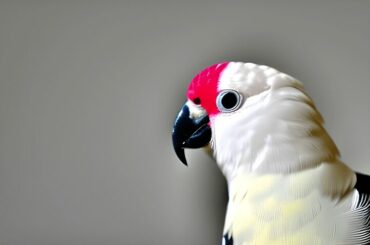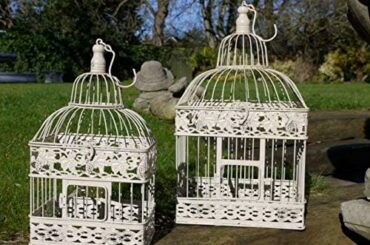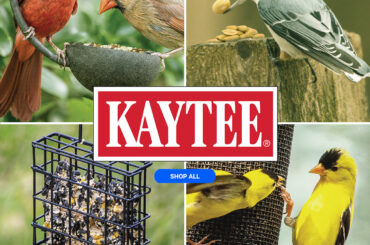Table of Contents
Introduction to Senegal Parrots
Senegal Parrots have gained immense charm and popularity among bird enthusiasts due to their captivating personalities and vibrant plumage. As potential owners, it is essential to understand their natural habitat in order to provide them with the best possible care. As a parrot lover, it’s important to have a comprehensive understanding of the Senegal Parrot lifespan of these delightful creature. In this article, we will delve into the captivating allure of Senegal Parrots and discuss the significance of understanding Senegal Parrot lifespan, providing valuable insights for all parrot enthusiasts out there.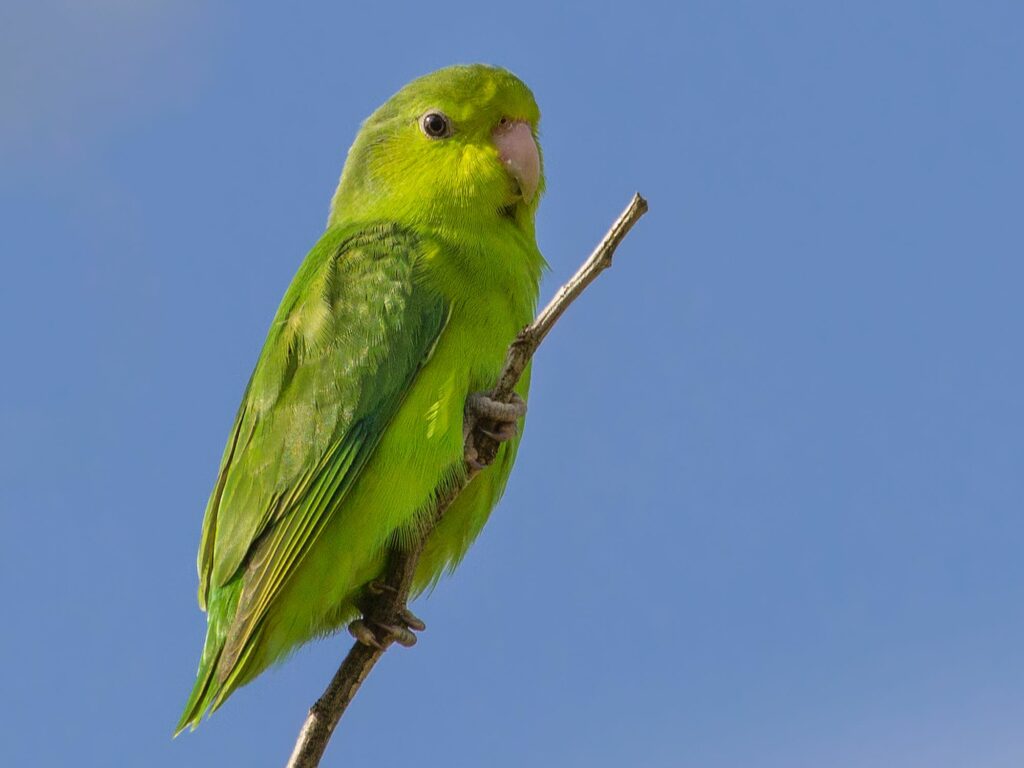
These parrots are native to the woodlands and savannahs of West Africa, particularly Senegal, which is where they get their name. Senegal Parrots are highly social creatures and thrive on companionship. Their small size and playful nature make them a delightful addition to any bird-loving household.
The Captivating Allure of Senegal Parrots
Senegal Parrots, scientifically known as Poicephalus senegalus, are native to the woodlands and savannas of West Africa, particularly in countries like Senegal, Guinea, and Mali. These small to medium-sized parrots are characterized by their vibrant plumage, with shades of green, yellow, and gray adorned with striking patterns. Their charming personalities make them excellent companions, as they are highly social and have the knack for building strong bonds with their human caregivers.
1. Remarkable Intelligence and Mimicking Abilities
One of the most captivating aspects of Senegal Parrots is their remarkable intelligence. They possess exceptional problem-solving skills and have shown their ability to use tools in the wild. In captivity, they have been known to learn complex tricks and commands, making them a favorite choice for parrot enthusiasts who enjoy training and interacting with their feathered friends.
Furthermore, Senegal Parrots have an astonishing mimicry capability. They can learn to imitate various sounds, including human speech, and have the potential to develop a vocabulary of over 100 words or phrases. Their ability to communicate with humans in this way adds an extra layer of fascination to their allure.
2. Lively Personalities and Playful Nature
Senegal Parrots are known for their lively personalities and playful nature. They possess a curious and inquisitive demeanor, often exploring their surroundings with great enthusiasm. They thrive on mental stimulation and require plenty of toys, puzzles, and interactive activities to keep their minds engaged and prevent boredom. Their playful antics and entertaining behaviors make them a joy to observe and interact with, bringing endless delight to parrot lovers.
3. Strong Emotional Bonding and Social Nature
One of the most endearing characteristics of Senegal Parrots is their capability to form strong emotional bonds with their human caregivers. These parrots are highly social creatures and thrive in environments where they receive regular social interaction and companionship. They enjoy being part of the family and can develop deep attachments to their human flock. For parrot lovers seeking a loving and affectionate feathered companion, Senegal Parrots often exceed expectations, providing unwavering loyalty and lifelong companionship.
The Importance of Understanding Lifespan for Parrot Lovers
As a parrot lover, it is crucial to have a comprehensive understanding of the Senegal Parrot lifespan. This knowledge plays a fundamental role in ensuring their well-being and longevity as our beloved companions.
1. Lifespan Variations Among Senegal Parrots
Senegal Parrot lifespan have an average of 20 to 30 years in captivity, although with proper care, some individuals have been known to reach even longer ages. It is essential to consider this lifespan when deciding to bring a Senegal Parrot into your home, as their longevity requires a long-term commitment and dedication to their care.
2. Emotional and Physical Well-being of Senegal Parrots
Understanding that the Senegal Parrot lifespan enables parrot lovers to provide the necessary emotional and physical care required for their well-being. These parrots thrive on mental stimulation, physical exercise, and a healthy diet. By offering a stimulating environment, regular interaction, and a balanced nutrition plan, parrot lovers can ensure that their Senegal Parrot remains emotionally fulfilled and physically fit throughout their lifespan.
3. Preparing for the Future
Having the knowledge of Senegal Parrot lifespan allows parrot lovers to make informed decisions and take necessary precautions for the future. As these birds can outlive their human caregivers, it becomes vital to create a plan for their ongoing care and well-being, ensuring they receive the love and attention they deserve even after we are no longer able to provide it ourselves.
Bringing a Senegal Parrot Home: Preparation and Setup
Creating a suitable living environment for your Senegal Parrot is crucial for their well-being. Consider the following factors when preparing their living space:
Ideal cage size and location
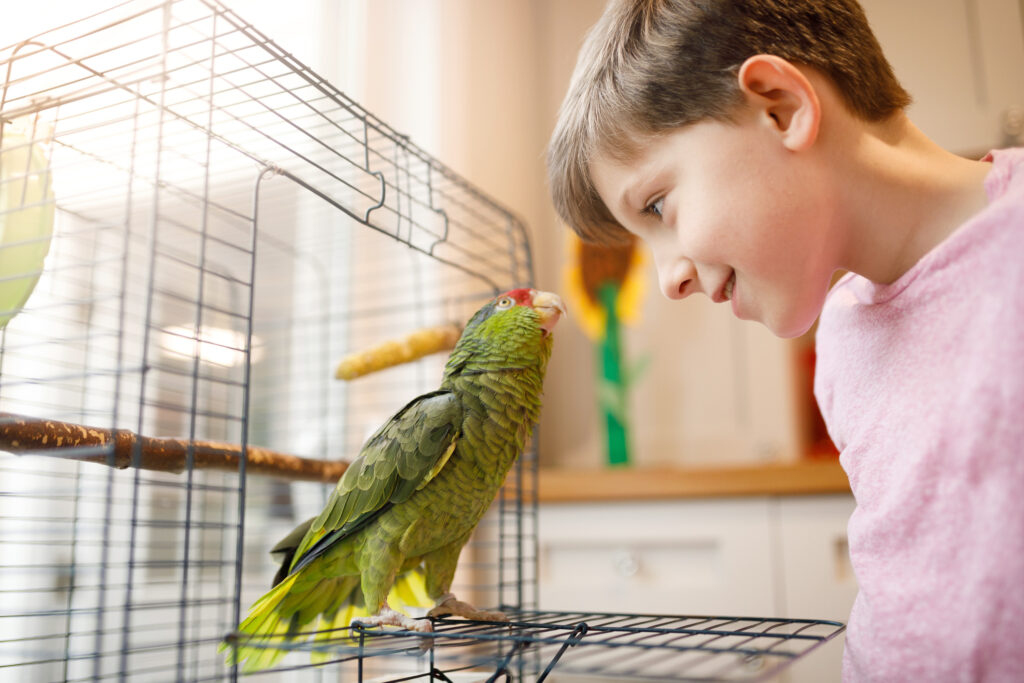
Provide your Senegal Parrot with a spacious cage that allows them to spread their wings and move about freely. A minimum cage size of 24″ x 24″ x 36″ is recommended. Ensure the cage is placed in an area that is well-lit, away from direct drafts or extreme temperatures.
Choosing appropriate perches and toys
Offer a variety of perches made from different materials to promote foot health and exercise. Natural wood perches with varying diameters are ideal for preventing foot problems. Additionally, provide your parrot with a range of stimulating toys, such as hanging ropes, puzzle toys, and foraging toys, to keep them mentally engaged and entertained.
Importance of a well-balanced diet
A nutritious and well-balanced diet is essential for the overall health of your Senegal Parrot. Provide them with a variety of fresh fruits, vegetables, high-quality pellets, and occasional protein sources such as cooked chicken or eggs. Avoid feeding them avocado, chocolate, caffeine, or any toxic substances that can harm their sensitive systems.
Essential supplies for a Senegal Parrot
To ensure your Senegal Parrot’s hygiene and grooming needs are met, the following supplies should be readily available:
Necessities for hygiene and grooming
Regularly clean the cage and provide fresh water daily. Place a shallow dish for bathing, as Senegal Parrots enjoy splashing around and maintaining their feathers. Grooming supplies such as nail clippers and a birdbath spray are essential for maintaining their physical well-being.
Recommended food and treats
Along with a balanced diet, offer your Senegal Parrot treats specifically designed for their species. These treats can be used as positive reinforcements during training sessions and can help strengthen the bond between you and your parrot.
Safe and stimulating toys
Invest in a variety of safe and engaging toys for your Senegal Parrot to keep them mentally stimulated. Toys that encourage foraging and problem-solving, such as puzzle feeders, can provide hours of entertainment and prevent boredom.
Building Trust and Bonding with Your Senegal Parrot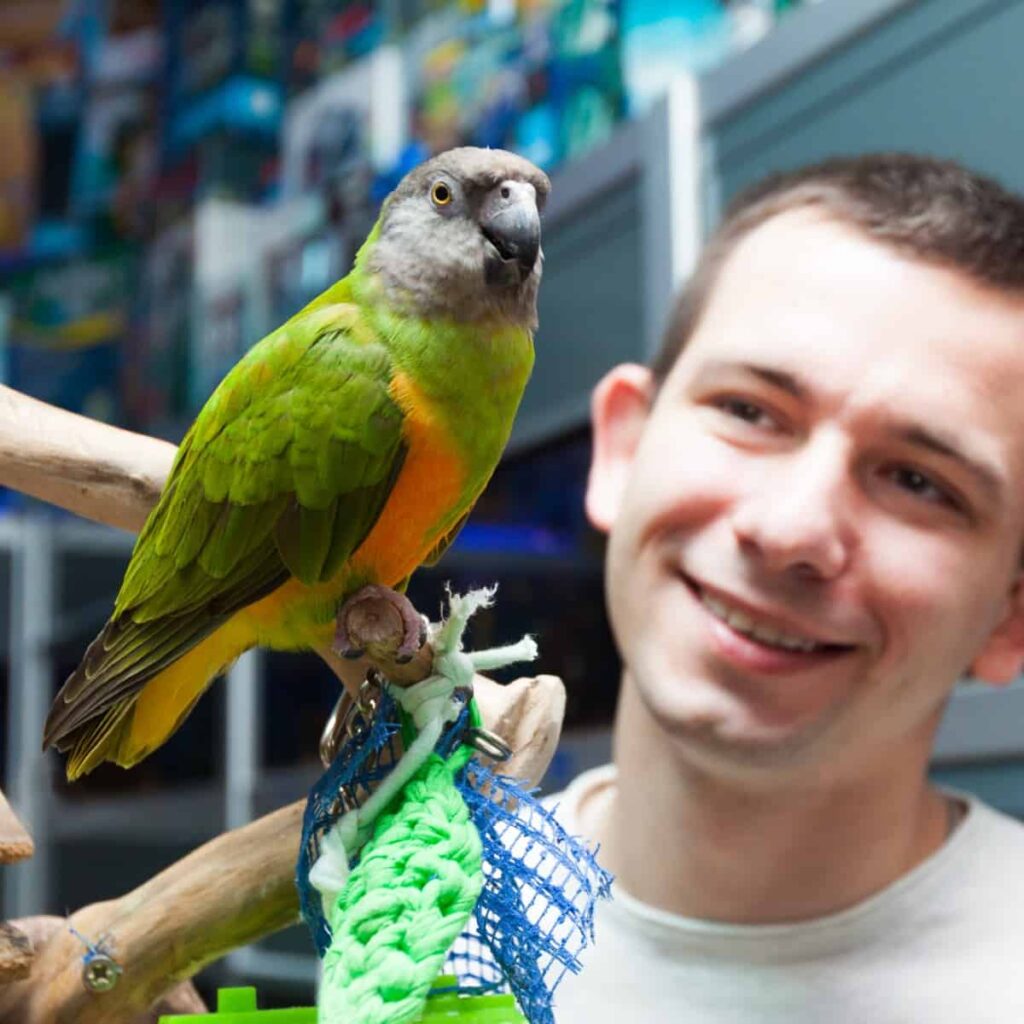
Establishing trust and a strong bond with your Senegal Parrot is crucial for their overall well-being and happiness. Consider the following strategies:
Establishing trust in the new environment
Patience is key when acclimatizing your Senegal Parrot to their new home. Allow them to explore at their own pace and avoid overwhelming them with sudden changes. Gradually introduce them to different areas of your house, offering treats and positive reinforcement to create positive associations.
Gentle handling and interaction
Handle your Senegal Parrot with care and respect. Always approach them calmly and avoid sudden movements that may startle them. Gradually build trust through gentle interactions, offering treats and speaking in a soothing voice.
Offering positive reinforcement
Positive reinforcement plays a crucial role in training and bonding with your Senegal Parrot. Reward desired behaviors, such as stepping onto your hand or responding to commands, with treats or verbal praise. This will encourage them to repeat these behaviors in the future.
Strengthening the bond through daily routines
Consistency and routine are essential in maintaining a strong bond with your Senegal Parrot. Implement the following practices:
Importance of regular feeding schedule
Establish a consistent feeding schedule for your Senegal Parrot, providing meals at the same time every day. This routine not only ensures they receive proper nutrition but also strengthens the trust and bond between you and your feathered friend.
Incorporating playtime and socialization
Senegal Parrots are intelligent and social creatures that require regular mental and physical stimulation. Dedicate time each day for play sessions, providing them with interactive toys and engaging in activities that promote physical exercise and mental enrichment.
Creating a safe space for your parrot
Designate a safe and comfortable space in your home where your Senegal Parrot can retreat to when they need some alone time. This area should provide them with privacy, peace, and a sense of security.
The Art of Training your Senegal Parrot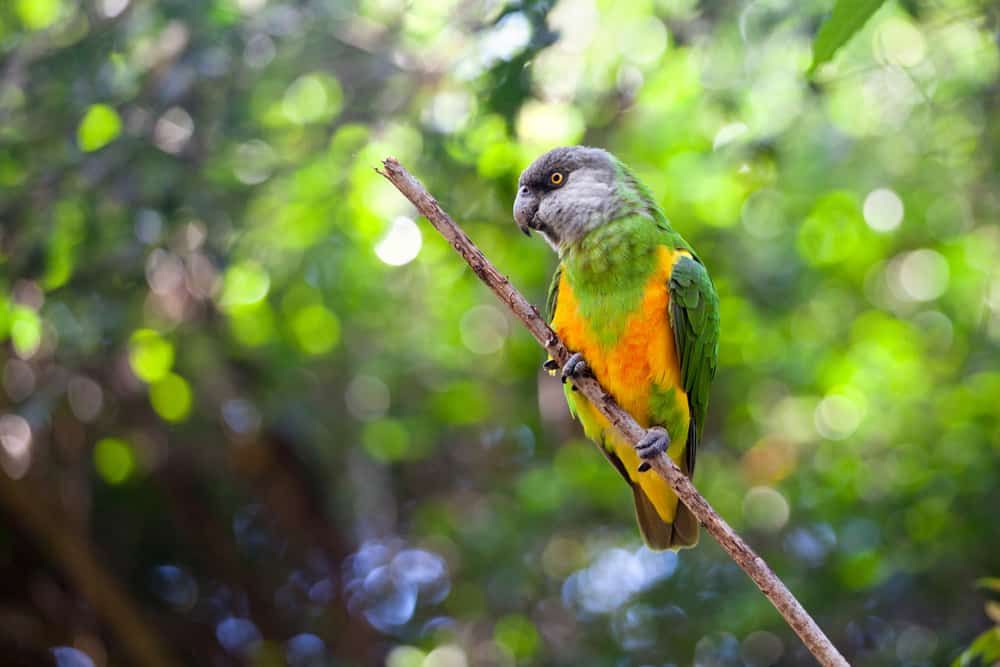
Training your Senegal Parrot can be a rewarding experience for both you and your pet. Follow these training techniques to enhance their skills and abilities:
Basic training techniques
Teach your Senegal Parrot fundamental commands, such as “step up” and “step down,” using positive reinforcement and rewards. Consistency and repetition are key to successful training. Break sessions into short, focused intervals to maintain their attention span.
Advanced training and enrichment activities
Once your Senegal Parrot has mastered basic commands, you can progress to advanced training and enrichment activities. Teach them tricks like retrieving objects, solving puzzles, or imitating sounds. Introduce foraging exercises to stimulate their natural instincts and keep their minds sharp.
Understanding Senegal Parrot Communication
Communication is a vital aspect of the bond between you and your Senegal Parrot. Learn to decode their body language and vocalizations to better understand their needs and emotions:
Decoding body language and vocalizations
Observe your Senegal Parrot’s body language to gauge their comfort level and wellbeing. Signs of comfort may include relaxed body posture, raised feathers on the head, and soft vocalizations. On the other hand, signs of discomfort or distress can include pinning of their eyes, fluffed-up feathers, or aggressive posturing.
Recognizing signs of comfort and discomfort
Senegal Parrots communicate through various vocalizations, including chirps, squawks, and screeches. Each vocalization has its own meaning and can express different emotions, such as happiness, fear, or alarm. By paying attention to their vocalizations, you can better respond to their needs and preferences.
Bonding through shared communication cues
As you spend more time with your Senegal Parrot, you will develop a unique language and understanding of each other. By establishing shared communication cues, such as certain words, whistles, or gestures, you can create a deeper bond and strengthen your connection with your parrot.
Responding to behavioral issues
While Senegal Parrots are generally well-behaved pets, they may occasionally exhibit behavioral issues that require attention and management:
Addressing excessive screaming or biting
Excessive screaming or biting can be caused by various factors, including boredom, frustration, or a need for attention. Address these behaviors by identifying the underlying cause and implementing appropriate solutions, such as providing mental stimulation, modifying the environment, or seeking professional advice.
Dealing with potential hormonal fluctuations
Senegal Parrots, like many other parrot species, may undergo hormonal fluctuations during certain times of the year. This can result in changes in behavior, including increased territoriality or nesting behaviors. Understanding and accommodating these hormonal changes can help manage potential aggression or mood swings.
Managing aggressive or territorial behavior
If your Senegal Parrot displays aggressive or territorial behavior, it is crucial to address the issue promptly. Consult with an avian behavior specialist or veterinarian to develop a behavior modification plan tailored to your parrot’s specific needs. Creating a calm and structured environment can help manage and reduce aggressive behaviors.
Senegal Parrot Health and Wellness
Ensuring the health and well-being of your Senegal Parrot is of utmost importance. Establish a routine of regular health check-ups and follow these guidelines:
Regular health check-ups and veterinary care
Schedule regular visits to an avian veterinarian who specializes in caring for parrots. This will help identify any potential health issues early on and ensure your Senegal Parrot receives appropriate medical care. Routine examinations, including blood tests and fecal examinations, can help detect underlying health problems.
Identifying signs of illness or distress
Monitor your Senegal Parrot for any signs of illness or distress, such as changes in appetite, drooping feathers, difficulty breathing, or abnormal droppings. Seek immediate veterinary attention if you notice any abnormalities, as early intervention is vital for their well-being.
Preventive measures for common health issues
Preventive measures play a crucial role in your Senegal Parrot’s overall health. This includes maintaining a clean environment, providing a balanced diet, monitoring weight and body condition, and regularly trimming their nails and wings. Consult with your avian veterinarian for further guidance on preventive healthcare practices.
Maintaining a balanced diet and exercise routine
A well-balanced diet and regular exercise are essential components of your Senegal Parrot’s overall health and wellness:
Recommended diet and nutritional guidelines
Offer a variety of fresh fruits, vegetables, and high-quality pellets as the foundation of your Senegal Parrot’s diet. Ensure that the diet is rich in essential nutrients, vitamins, and minerals. Consult with your avian veterinarian to create a customized meal plan that meets the specific needs of your parrot.
Exercise options to promote physical fitness
Senegal Parrots are highly active and require regular physical exercise to maintain optimal health. Encourage flight and provide opportunities for climbing, swinging, and exploring their environment. Regular exercise not only improves their physical fitness but also stimulates their mental well-being.
Regular grooming practices and hygiene requirements
Develop a grooming routine that includes regular nail trims, beak maintenance, and feather care. These practices are essential for preventing overgrown nails, addressing beak abnormalities, and ensuring proper feather health. Consult with your avian veterinarian for guidance on appropriate grooming techniques.
Senegal Parrot Lifespan Expectancy and Enriching Aging Senegal Parrots
Understanding the typical lifespan of Senegal Parrots is essential for long-term care planning. As your parrot ages, it is crucial to adapt their care routines to cater to their changing needs:
Understanding the typical lifespan of Senegal Parrots
Senegal Parrots have an average lifespan of 20 to 30 years in captivity when provided with proper care and nutrition. However, some have been known to live even longer, reaching 40 years or more. Being aware of their potential lifespan allows you to provide long-term care and plan for their well-being.
Adjusting care routines for older parrots
As your Senegal Parrot ages, adjustments to their care routines will become necessary. Monitor their physical and cognitive abilities, and modify their diet, exercise, and mental stimulation accordingly. Provide extra comfort and support, ensuring they have access to a safe and comfortable living environment.
Catering to changing dietary needs
Older Senegal Parrots may have different dietary requirements due to changes in their metabolism and overall health. Adjust their diet accordingly, providing softer or more easily digestible foods if needed. Consult with your avian veterinarian to create a suitable meal plan for your aging parrot.
Adjustments to exercise and mental stimulation
As your Senegal Parrot ages, their physical abilities may change. Adapt their exercise routine to suit their current capabilities while still promoting physical and mental well-being. Provide appropriate toys, puzzles, and games that challenge their cognitive abilities without overwhelming them.
Monitoring and managing age-related health issues
As your Senegal Parrot gets older, they may be prone to age-related health issues such as arthritis or obesity. Regular veterinary check-ups become even more important to detect and manage these conditions promptly. Follow your avian veterinarian’s advice for any necessary medical interventions or adjustments to their care routine.
Read Also:
- Senegal Parrot for Sale at Unbeatable Prices: Find Your Perfect Feathered Companion
- Jenday Conure Species Profile: Bringing the Beauty of the Wild to Your Home
Conclusion
Owning a Senegal Parrot Lifespan is a journey filled with enchantment and joy. Understanding the captivating allure of these remarkable birds, along with Senegal Parrot lifespan, is crucial for all parrot lovers. By comprehending their unique characteristics, emphasizing their emotional and physical well-being, and preparing for the future, we can ensure that our Senegal Parrot companions live a long, happy, and fulfilling life. So, let’s embark on this adventure of parrot companionship with knowledge and appreciation, forging a bond that will last a lifetime.
Frequently Asked Questions (FAQs)
Can Senegal Parrots talk?
Yes, Senegal Parrots are known for their ability to mimic and learn human speech. While not all individuals will develop this skill, many Senegal Parrots can learn a wide range of words and phrases with proper training and consistent interaction.
How long does it take for a Senegal Parrot to bond with its owner?
The time it takes for a Senegal Parrot to bond with its owner can vary. Some birds may form a strong bond relatively quickly, while others may take several weeks or even months. Patience, consistent interaction, and positive reinforcement are key to building a strong and trusting relationship.
Are Senegal Parrots suitable pets for families with children?
Senegal Parrots can make suitable pets for families with children, but careful supervision is necessary. Teach children how to interact with the parrot gently and respect its boundaries. Always supervise interactions to prevent accidental harm to the bird or children.
Are they prone to any specific health problems?
Senegal Parrots can be prone to certain health issues such as feather plucking, respiratory infections, and vitamin deficiencies. However, with proper care, a nutritious diet, and regular veterinary check-ups, many of these issues can be prevented or managed effectively.
How can you prevent excessive noise or screaming behavior?
Excessive noise or screaming behavior can be prevented or minimized through proper stimulation, attention, and a consistent routine. Ensuring your Senegal Parrot receives enough mental and physical exercise can help reduce the likelihood of such behaviors. Additionally, reinforcing desirable behaviors through positive reinforcement techniques can help redirect their focus and prevent excessive noise.
What is the average Senegal Parrot lifespan?
Senegal Parrots have an average lifespan of 20 to 30 years in captivity when provided with proper care and nutrition
Can Senegal Parrots live longer than their average lifespan?
Yes, with proper care and good nutrition Senegal Parrot Lifespan can be very much longer than their average lifespan
How do I provide a healthy diet for my Senegal Parrot?
Their deits should be filled with nuts, fruits, seeds, vegetable and it must contain about 55% to 80% of pelleted food
Are there any particular exercises that benefit Senegal Parrot lifespan?
There is no particular exercise needed. Overweight will lead to an unhealthy parrot due to the lack of exercise.

